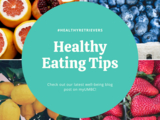Healthy Eating Tips
#HealthyRetrievers
College students are facing academic demands as well as the physical and mental demands of the COVID-19 pandemic.
Especially during this time, focus on what you can control, such as maintaining healthy eating habits. Eating balanced, nutritious meals is associated with improved academic performance, strengthened immune system, and increased energy.
Here are some easy and budget-friendly tips to prioritize healthy nutrition at UMBC and help you get that A!
- Make healthy substitutions on- and off-campus.
- You may have noticed that True Grits and several other campus restaurants give students the option of choosing fresh fruit instead of fries or chips to eat with their main course.
- Off-campus restaurants also provide side salads, cooked vegetables, and fresh fruit. So skip the waffles fries and go for that red, shiny apple (or sour green one) instead.
- Eat the rainbow. Think of creative ways to include a variety of colorful fruits and vegetables in your diet. Throw a handful of spinach in your breakfast smoothie. Choose a plant-based meal at True Grits. Get festive with bright spring favorites like lemons, strawberries, and asparagus.
- Control your portions. The buffet style dining experience at dining halls or the unbalanced portions served at many restaurants may tempt students to eat more than necessary, but listen to your stomach. Try eating half...your future self will thank you. If you’re snacking, avoid eating straight from the snack’s original container and put one serving on a small plate instead.
- Prepare several meals ahead of time if you’re living off-campus. Do you find yourself stopping at a fast food restaurant because you’re running short on time? While fast food restaurants may have some balanced options, we are more likely to eat balanced and affordable meals when we prepare them at home. So skip the Happy Meal occasionally and try your hand at a home cooked meal. Try making large portions of a couple meals on the weekend and separate the larger portions into smaller portions to eat during the week.
- Manage “stress snacking”with planned snacks and meals throughout your day. Aim to limit yourself to 1-2 snacks a day. If you find yourself reaching for processed snacks such as chips and baked goods frequently, try substituting them with a handful of mixed nuts, a cup of yogurt, or a piece of fruit. Eating a couple snacks each day can provide a boost of sustainable energy to get you to your next meal and keep you from falling asleep during your virtual lectures.
For more tips on prioritizing healthy nutrition or to schedule a virtual appointment with our campus dietitian, visit https://dineoncampus.com/UMBC/meet-your-dietitian.
Posted: March 12, 2021, 12:29 PM
